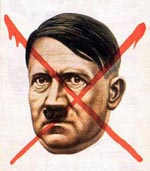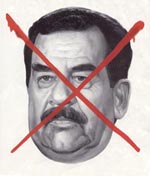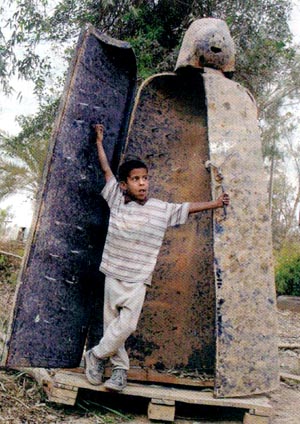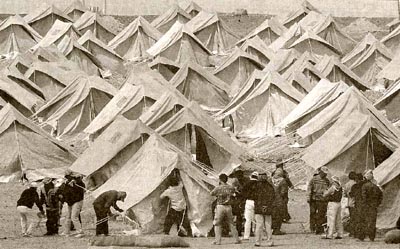 |
War against Terrorism
Is There Nothing Worse than War?
Marian Therese Horvat, Ph.D.
Deliver us from evil, we pray daily in the Our Father. To hear some ecclesiastics talk today, the particular evil of our day is war. It is not tyranny and injustice, nor sins against Catholic Morals. Of course for them evil is not religious indifference based on tolerance for all religions. It is simply war, and in particular the war in Iraq.

Martino: war is "a crime that cries out for vengeance before God" |
“War is a crime against peace that cries out for vengeance before God.” [1] Archbishop Renato Martino, President of the Vatican Council for Justice and Peace, told us. The new criteria of Archbishop Martino is curious. I don’t recall having heard anyone in the Vatican recently qualifying homosexuality – and its abominable consequence, pedophilia – as crimes that cry out for vengeance before God. Even though it was clearly classified as such in the Catechism where I learn my Catholic doctrine.
Given the Vatican’s incredible tolerance for many contemporary moral evils I thought that it had forgotten this category of crime – the ones that call out for God’s vengeance. But I was mistaken. As soon as Bush and Blair announced war, Martino brought out that rusty and forgotten sword and utilized it against them. In fact, Archbishop Martino’s attitude was quite bellicose; one might say he was waging war against those who still support war. Why was his act of war good and the other bad? In his pacifist fury, the Reverend Archbishop simply forgot to explain.
Many humanitarian-based statements about the war from Church dignitaries and committees were delivered following the same Vatican orientation. USCCB president Bishop Wilton Gregory echoed the Holy Father’s admonition that “war is always a defeat for humanity,” and said war should be averted on behalf of the “long-suffering people of Iraq,”[2] referring to the embargo placed on Iraq at the request of the United States and Great Britain. In a meeting with President Bush in early March, Cardinal Pio Laghi, the Pope's special envoy, pleaded that the American President check any war plans. Why? Again, the embargo: “in the interests of the suffering people of Iraq.”[3] According to a document issued by the Pontifical Council for Religious Dialogue, this was a war that could only bring about “oppression and aggression against the human person.” [4]
Now, it seems to me that in the wake of the Iraqi war, the defenders of the above mentioned arguments might have the decency to blush. First, because it was a war fought with remarkable military precision and produced the least possible damage to a civilian population. Second, because every day brings revelations of “oppressions and aggressions” that were not caused by either the embargo or the war, but were being suffered by the civilian population under the brutal Hussein government.
 |
Front cover of Time - May 1945 |

Time - April 21, 2003 |
The sense of justice of the anti-war religious leaders and media is quite strange. They were clamoring in favor of the Iraqi people. Yet when in the last weeks it became blatantly clear to the eyes of the world that Hussein was oppressing the Iraqi people with a Hiter or Stalin-style fierceness, the same leaders had hardly a word of blame for the tyrant. Were they sincere before the war in the great concern expressed for the human person? So, why no sign of remorse now for their erroneous predictions? Are they sincere now? Then, why no expression of relief and joy for seeing the Iraqi people released?
Awakening to the reality
Listening to the news the other morning, I heard the surprised and shocked voice of a National Public Radio reporter who, in a liberal daze, was stunned at the number of Iraqi people on the Baghdad streets eager to tell their stories of torture, oppression, and horror as experienced under the Saddam Hussein regime. In a Washington Post report, Susan B. Glasser related some of these testimonies. Let me repeat a few:
She spoke to a young man, Anwar Abdul Razak, who had no ears. They had been cut off after he was caught absent without leave from his military unit in 1994. Hussein had just imposed this “new” punishment to stop the flood of army desertions in the 90s. “It was obligatory in all the hospitals,” admitted Jinan Sabagh, chief of surgery at Basra Teaching Hospital. “There wasn’t a choice.”
 |
Today a boy is free to play in the iron maiden with spikes used to torture athletes who performed below expectations -Time, April 28, 2003 |
According to the testimonies, torture was routine. Anything said or done against the government opened a door to danger. A rumor or suspicion was enough to warrant a police “inspection,” in which torture was systematically applied to exact “confessions ” - or denunciations that came from parents against children, friends against neighbors, strangers against strangers “Of course they tortured me,” said Maithm Naji. “Beating people here is something regular.” He was arrested and jailed and tortured for speaking with a UN representative who came by his house for a few minutes in 1998.
“Iraq was a prison,” said Arif Orthman, who fled the army in 1991. Naively believing the sincerity of a reported amnesty, he returned to Iraq in 1998 only to be arrested and tortured.
In almost every case, Glasser reported, torture was part of a broader story of arrests, disappearances, executions and destroyed homes. Some victims were, in fact, part of the resistance party against the Iraqi government; others were under suspicion simply because of a family member who did not agree with the regime, or because they were Shiite.
These stories of torture are not pleasant. Saad Abdul Wahab said jailers placed electrodes on his navel to administer shocks. Nabili Abdul Ali said his shoulders were dislocated and an electric wire was wrapped around his private parts and attached to a hand-cranked machine. Zuhair Kubba said he was hung upside-down and beaten with an iron rod.
The methods of torture were endless: electric shocks applied to various parts of the body, razor blades used to slash the backs of prisoners; wives, sisters and mothers raped or stripped naked before the eyes of husbands, brothers and fathers; prisoners forced to sit on heated metal stoves; eyes gouged out, hand and feet amputated; foreheads branded and ears cut off.
Now, if this were the first news of such torture and atrocities, there might be some excuse for the great surprise of the West to “discover” such barbarities. But there were many other reports before now. For instance, an official August 2001 report of Amnesty International, titled “Systematic torture of political prisoners in Iraq,” states:
“Torture is used systematically against political detainees in Iraqi prisons and detention centers. The scale and severity of torture in Iraq can only result from the acceptance of its use at the highest level. There are no attempts to curtail or prevent such violations or punish those responsible. This total disregard for a basic human right, the right not to be tortured or ill-treated, grossly violated international human rights law which prohibits torture in all circumstances.” [5]
This report certainly raises an important question. Why did the Vatican, which so vehemently protested the war on humanitarian grounds, ignore these reports of systematic state-orchestrated violence against Iraqi citizens?
In fact, when fingers were pointed, why was it at the “inhumane” embargo against Iraq, with the strong implication that America was to blame for it? Why was the war that America waged labeled “the defeat for humanity,” and no critique made against a tyrannical and corrupt regime that was strangling its own people?
Is there nothing worse than war?
Stories of the awful day-to-day life of the civilian population in Iraq continue to emerge. I don’t have to go much further than the morning newspaper Los Angeles Times (March 27, 2003), which was, by the way, faithful to its liberal creed in its anti-war stance and reporting.
 |
Camps were set up to receive an exodus of Iraqi refugees fleeing the war. They remained empty since the civilians did not feel threatened by the American/British attacks and stayed in their homes.
|
In section one is a report of a mass grave revealed by a gravedigger, himself afflicted by memories of men tortured, beaten, shot and disposed of.
An editorial tells us that – so far – it is figured 250,000 people were detained or murdered by the government of Saddam Hussein.
On another page is the story of Mustafa, a senior in high school when armed government thugs came to the family house and took him away. He was tortured, the family house was razed.
Another feature article details the fear of teachers in the elementary and secondary schools, who had to begin each day with a song praising Hussein and follow a state-mandated curriculum brimming with regime propaganda. Government supervisors would sit in on classes every few weeks, and teachers were nervously aware that a word could be misconstrued by students of families connected to the Hussein regime who were watching for “slip-ups.” “We were frightened all the time,” said Kitam Naama, a first-grade teacher.
Perhaps one of the most shocking stories for Western sensibilities was the news that emerged about the political jail in Baghdad for children. Their crimes? Everything from suspicion of “treason” for belonging to families suspected of “political crimes” … or simply because they had not joined the youth branch of the Ba’ath party.
Still there are those who continue to assert that there is nothing worse than war. Don’t get me wrong: I don’t like war. Following my feminine instincts, I always prefer to find ways of peace rather than embark on paths of war. But peace is not an absolute good, to be had at any cost. The liberation of an oppressed people, putting an end to a corrupt regime, restoring the honor of an affronted country are ideals that are more valuable than peace. In the glorious war of the Machabees at its beginning Mathathias cried out, justifying the fight:
"Woe to me, wherefore was I born to see the ruin of my people, and the ruin of the holy city ... She that was free is made a slave. And behold our sanctuary, and our beauty and our glory was laid waste and defiled ... To what end then should we live any longer?" (1 Mach 2:7-13)
He was speaking not only from experience. His words were inspired by the Holy Ghost.
When I hear stories of the systematic torture of civilians and political prisoners in the socialist and tyrannical regime of Hussein, I am reminded of similar tales of anguish from men and women behind the Iron Curtain. And I was asking, as I asked then: Isn’t anyone going to do something? Fortunately, some one did. In fact, on humanitarian grounds alone, one could argue that this was a war worth fighting, a just war. But there were other reasons that made this a just war as well.
Yes, there are causes worth fighting for, and there are things much worse than war. This is something that the Catholic Church has always taught.
1. Zenit News, “Intervention in Iraq Would be a Crime,” March 19, 2003).
2. Ibid, “Bishop Gregory’s Statement on War with Iraq,” March 20, 2003).
3. Ibid, “Holy See Maintains That There are Still Peaceful Avenues,” March 6, 2003).
4. From the Islamic-Catholic Statement on Terrorism and Peace, issued March 2, 2003, by the Joint Committee of the Permanent Committee of Al-Azhar for Dialogue with the Monotheistic Religions and the Pontifical Council for Religious Dialogue.
Posted on April 29, 2003

|
War | Hot Topics | Home | Books | CDs | Search | Contact Us | Donate

© 2002- Tradition in Action, Inc. All Rights Reserved
|
 |
|